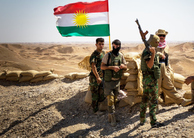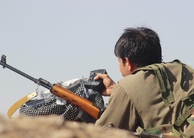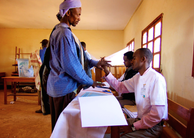|
Political Science
Page 19/33 | Showing results 271 - 285 of 493
2013, Vol. 6 No. 2
For all the border-transcending, common cause implications of the popular moniker "the Arab Spring," the sociopolitical upheaval it is meant to allude to seems, upon superficial review of its developing impacts, to have largely missed the Persian... Read Article »
2013, Vol. 6 No. 2
After the Partition of India in 1947, the two nascent countries of India and Pakistan each faced the difficult task of nation-state consolidation; however, Pakistan's problem was exacerbated by the fact that it had been geographically divided even... Read Article »
2013, Vol. 6 No. 2
Regionalism, as Edward Mansfield describes, usually involves policy coordination through formal institutions within a region.1 Although there are conceptual debates surrounding what a region is and what regionalism is, empirically speaking one would... Read Article »
2013, Vol. 5 No. 04
Corruption is damaging in almost every economic aspect, but it can play a crucial role in the dynamics of political changes and reforms. Examination of corruption’s effect in the economic reforms of China during the 1980s reveals that corruption... Read Article »
2013, Vol. 5 No. 04
When U.S. President Ronald Reagan left office in 1989, he enjoyed a reputation as one of the most rhetorically dynamic Presidents of the twentieth century. His remarkable speaking ability was not surprising because, before his transition into politics... Read Article »
2013, Vol. 5 No. 02
Although the ‘Perónist Years’ amounted to a little less than a decade, Juan Perón’s presidency had long-lasting effects. As historians Matthew B. Karush and Oscar Carosa write, “Perón transformed Argentina... Read Article »
2013, Vol. 5 No. 02
Of the three states in the South Caucasus, Georgia has experienced the most political instability since the collapse of the USSR. Some scholars even described the country in the immediate aftermath of independence as a failed state. Despite the... Read Article »
2013, Vol. 5 No. 01
Unfortunately, the Caucasus often conjure images of violence and war in the minds of many people. Indeed, the region has been plagued by violent conflict especially during the collapse of the Soviet Union and through the first decade of independence... Read Article »
2012, Vol. 2 No. 1
The last decade of American military policy has been dedicated to fighting an enigma – how to wage war against an enemy that does not think, act, or fight like we do; an enemy that wears no uniform, utilizes any tactic, and swears its allegiance... Read Article »
2012, Vol. 2 No. 1
In the 1960s because of a stagnant economy, the Federal Republic of Germany (hereinafter as West Germany) invited Turks to Germany to work as "guest workers" (Legge 2003, 142). They were to work there for two years and then return to their homeland... Read Article »
2012, Vol. 2 No. 1
The research completed aimed to show that the idea of fair trade, using the example of goals for the chocolate industry of the Ivory Coast, can be described as an example of the economic ideal which Karl Marx imagined. By comparing specific topics... Read Article »
2012, Vol. 2 No. 1
In light of women's underrepresentation in student government, this paper investigates to what extent levels of political ambition differ between male and female students and why at American University. Current literature regarding women's underrepresentation... Read Article »
2012, Vol. 2 No. 1
Over the past 20 years, the international order has been characterized by the conflict between the United States' desire for isolationism and its desire to maintain hegemony. While the United States has initiated and continued wars in Afghanistan... Read Article »
2012, Vol. 4 No. 12
In May 1991, Somaliland emerged as a self-declared independent state in the aftermath of the failure and subsequent collapse of Siyad Barre’s Somalia. Although ethnically and linguistically Somalilanders are undifferentiated from their counterparts... Read Article »
2012, Vol. 4 No. 12
While in many cases it serves as a stabilizing factor in the international system, and can even be called a force for good, international law cannot be considered “law” when applied to states or state action. To be considered “... Read Article »

Expedited Article Review
Submit an article and get a decision fast.
If you need a fast decision, INQUIRIES Journal offers expedited processing of your submission for a small fee. Depending on the expedited review option you choose, you can receive a decision in as few as 5-days.
In addition to a shorter review period, the fee supports the journal's continued operation and open-access publishing model. Standard submissions are always free. Submit Now » - Submit an Article to Inquiries Journal -
|













